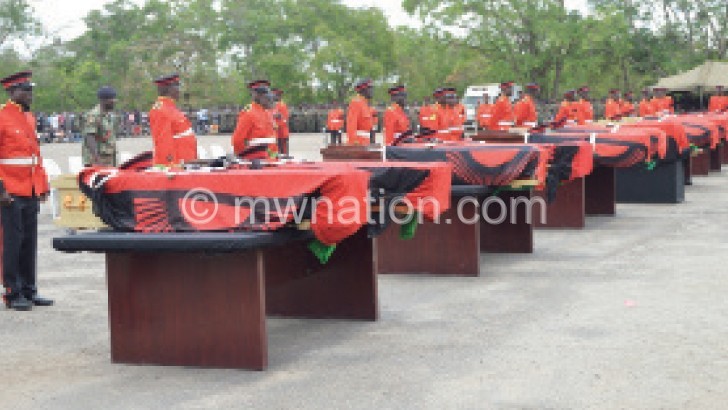Horror of road carnage
tatistics from the Directorate of Road Traffic and Safety Services (DRTSS) paint a grim picture: From July to September this year, 329 lives were lost on the country’s roads.
It appears gone are days travelling by road was a marvel to gaze at the scenery of this tropical savannah that make the country one of the places to go globally.
For all its affordability and the stunning sights it offers, the roads of Malawi have become so scary that travellers are never certain whether they will get to their destination alive.

Everyday disaster
The recent accident at Mapanjila in Mzimba, which killed 22 soldiers, has left the nation horrified.
Road accidents have become an everyday disaster that only causes a stir on the social media.
But the number of people dying of what goes into the media as “devastating disasters” are by far outnumbered by the death toll on the country’s roads.
In fact, the three-month count from the DRTSS is almost twice the 106 people killed by floods that ravaged 15 of the country’s 28 districts in 2015.
This calls for renewed action to make the country’s roads safe as trends show the number of road accidents have tripled for the past five years, killing almost 1 300 people a year.
According to DRTSS spokesperson Angelina Makweche, the death rate is soaring due to over-speeding.
“There were 854 road accidents between July and September this year. About 330 lives were lost,” she says.
The Central Region registered 500 accidents out of which 150 were fatal. The South recorded 262.
According to Makweche, the directorate is devising ways of reducing accidents.
One of the new measures include a Toll-free line, 4040, where people can report motorists violating traffic laws, she said.
Others include intensified mass awareness campaigns and enforcement of traffic regulations currently under review.
“Road safety is a cross-cutting issue which requires coordination from different sectors, including general public, in exercising caution when using the road,” she says.
Blame it on drivers
Southern Region Police spokesperson Rodney Mushani says reckless drivers are the major cause of the deplorable carnage.
“Most drivers ignore road signs, some drive under the influence of alcohol while others have a sheer excitement of over-speeding,” he says.
Mushani discredited a widespread view that traffic police officers have failed to reduce road accidents.
The law enforcers are accused of getting kickbacks from negligent motorists instead of strictly enforcing traffic laws.
But Mushani says the police cannot be everywhere nor track every vehicle on the road.
He explains: “The public has a responsibility to prevent accidents. They must ensure that their vehicles are roadworthy and carrying the recommended load capacity.
“Passengers must ensure that drivers are driving responsibly and report to relevant authority when they behave irresponsibly.”
Traffic police use speed traps, breathalysers and impromptu roadblocks to bring sanity among road users.
However, this has not stopped accidents from happening.
Third worst hit
In 2015, the World Health Organisation (WHO) Global Road Safety report named Malawi as the nation with the third-highest rate of road traffic deaths—35 deaths per 100 000—only rivalled by Libya and Thailand.
African nations dominate the list.
Ninety percent of the accidents occur in developing countries such as Malawi, though they have just 54 percent of the world’s vehicles.
As reckless driving keeps killing travellers, some road users blame the shocking carnage to pitiable road conditions.
This perspective brings into question the mandate of Roads Authority (RA) to construct and maintain main roads across the country.
But RA spokesperson Portia Kajanga says the increasing accidents have nothing to do with the state of the roads.
“Our roads are very safe,” she retorts. “As Roads Authority, we are always ready to do maintenance works where we feel it is not safe for motorists. She reckons drivers’ mindsets, condition of vehicles and fatigue could be the major causes of accidents in Malawi.
“Some people don’t check the conditions of their vehicles. This is dangerous. Motorists should always ensure that their vehicles are in good conditions before embarking on a journey,” she advises.
Praying for safety
Kajanga warns drivers against driving when they feel weary, saying fatigue causes lapses in concentration.
Buxton Kapachira, a minibus operator in Blantyre City, admits that accidents are caused by more than just poor conditions of roads.
“An accident is just an accident—unpredictable. We just need to be careful on the roads,” he says.
In 2004, astonishing frequency of fatal accidents near Linthipe Bridge catalysed an influx of pastors who pray for travellers before buses depart major depots across the country.
There are mixed reactions to the prayers as opportunists, motivated by cash handouts, have crept in.
But the sermons and intercessions amplify the uncertainties on the accident-prone roads.
“The pastors are making easy money, taking advantage of scared commuters travelling long distances,” says a frequent traveller based in Blantyre. n





